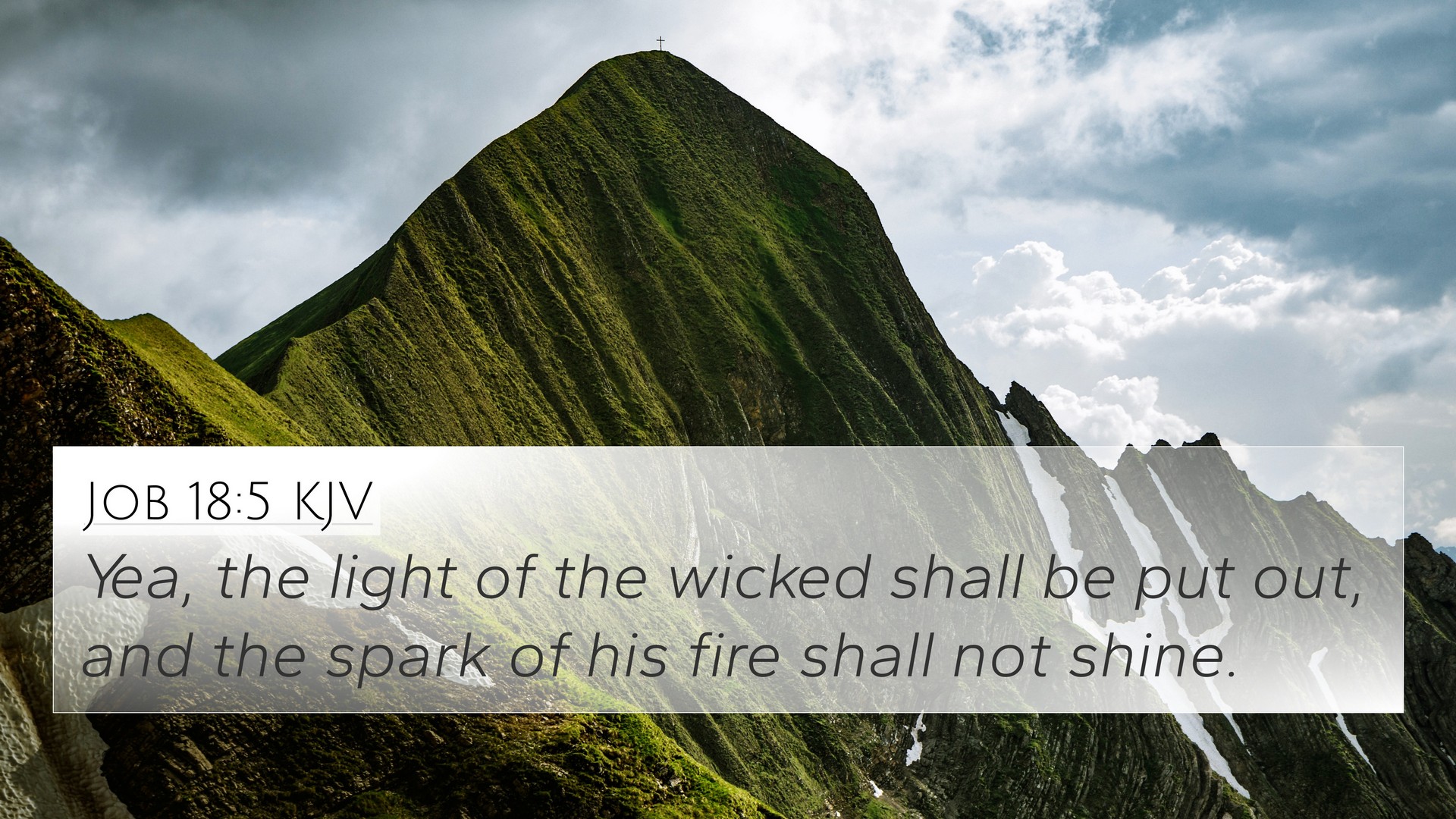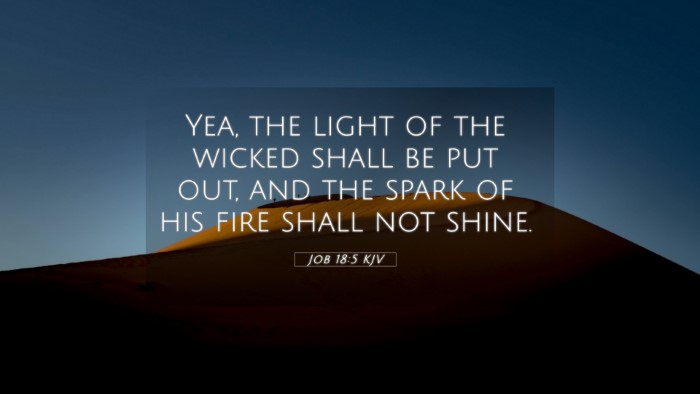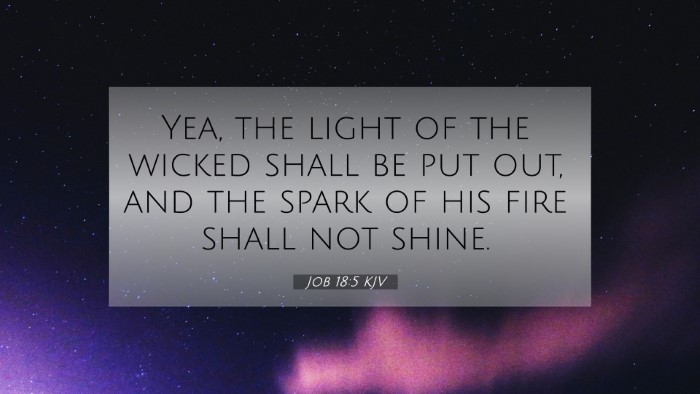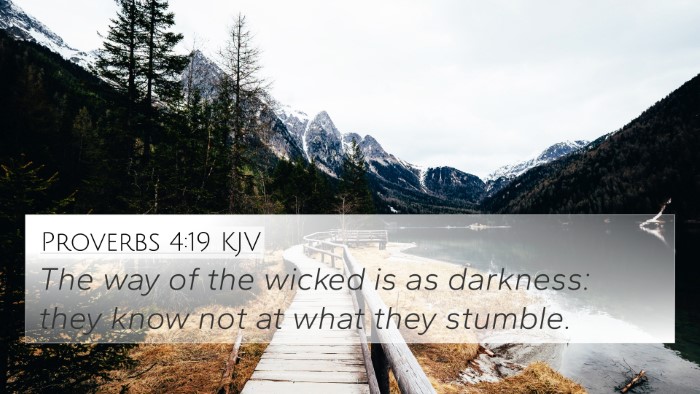Old Testament
Genesis Exodus Leviticus Numbers Deuteronomy Joshua Judges Ruth 1 Samuel 2 Samuel 1 Kings 2 Kings 1 Chronicles 2 Chronicles Ezra Nehemiah Esther Job Psalms Proverbs Ecclesiastes Song of Solomon Isaiah Jeremiah Lamentations Ezekiel Daniel Hosea Joel Amos Obadiah Jonah Micah Nahum Habakkuk Zephaniah Haggai Zechariah MalachiJob 18:5 Similar Verses
Job 18:5 Cross References
Yea, the light of the wicked shall be put out, and the spark of his fire shall not shine.
Uncover the Rich Themes and Topics of This Bible Verse
Listed below are the Bible themes associated with Job 18:5. We invite you to explore each theme to gain deeper insights into the Scriptures.
Job 18:5 Cross Reference Verses
This section features a detailed cross-reference designed to enrich your understanding of the Scriptures. Below, you will find carefully selected verses that echo the themes and teachings related to Job 18:5 KJV. Click on any image to explore detailed analyses of related Bible verses and uncover deeper theological insights.
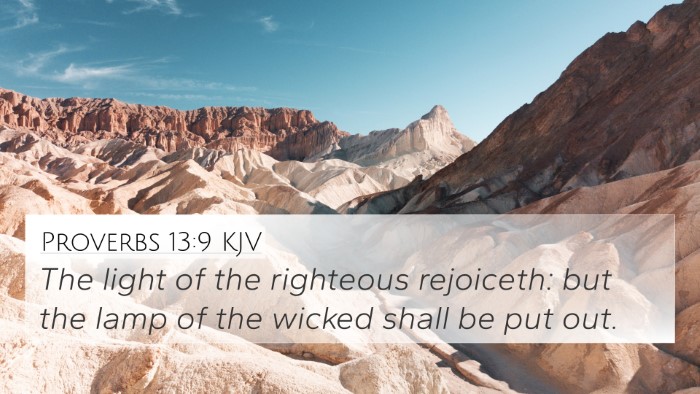
Proverbs 13:9 (KJV) »
The light of the righteous rejoiceth: but the lamp of the wicked shall be put out.
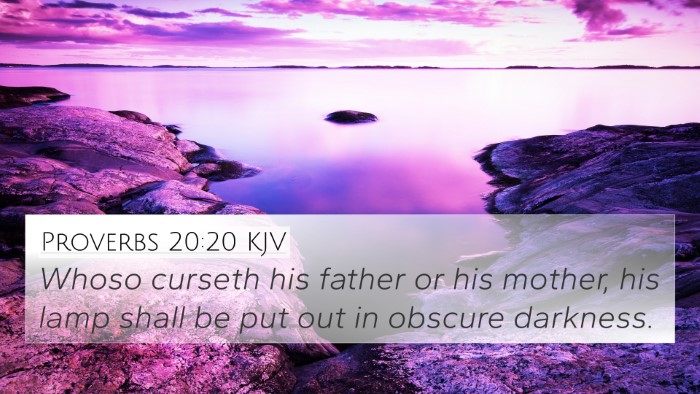
Proverbs 20:20 (KJV) »
Whoso curseth his father or his mother, his lamp shall be put out in obscure darkness.
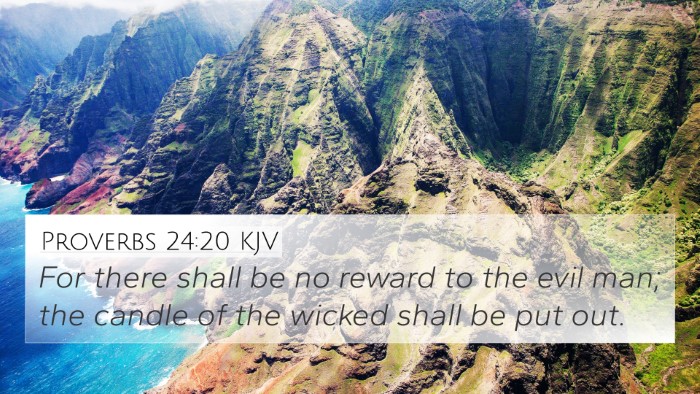
Proverbs 24:20 (KJV) »
For there shall be no reward to the evil man; the candle of the wicked shall be put out.
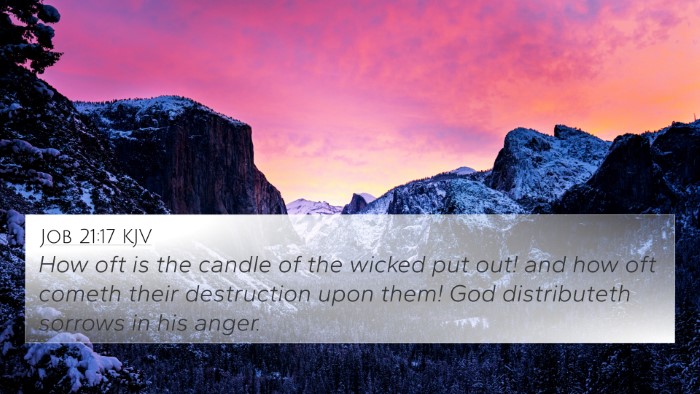
Job 21:17 (KJV) »
How oft is the candle of the wicked put out! and how oft cometh their destruction upon them! God distributeth sorrows in his anger.
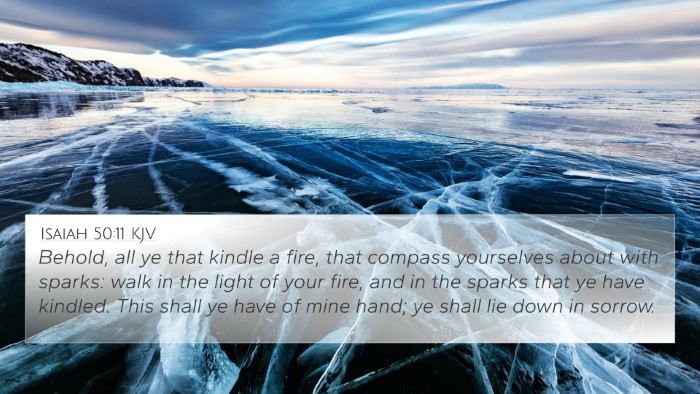
Isaiah 50:11 (KJV) »
Behold, all ye that kindle a fire, that compass yourselves about with sparks: walk in the light of your fire, and in the sparks that ye have kindled. This shall ye have of mine hand; ye shall lie down in sorrow.

Job 20:5 (KJV) »
That the triumphing of the wicked is short, and the joy of the hypocrite but for a moment?
Job 18:5 Verse Analysis and Similar Verses
Understanding Job 18:5
Job 18:5 states: "The lamp of the wicked is put out, and the flame of his fire does not shine." This verse delivers a profound message about the fate of the wicked and, more broadly, the nature of divine justice.
Summary of Insights
The verse, found in the context of Job's discourse, serves as a stark reminder of the consequences of wickedness. Public domain commentaries offer rich interpretations that illuminate the depth of its meaning.
- Matthew Henry: Henry emphasizes the certainty of divine retribution. He suggests that the 'lamp' signifies the prosperity and success that wicked individuals may appear to enjoy, which will ultimately be extinguished by God's judgment.
- Albert Barnes: Barnes notes that this imagery of light and darkness serves as a metaphor for life and death. The extinguishing of the wicked's lamp represents the end of their life and the cessation of their influence.
- Adam Clarke: Clarke elaborates on the symbolism in this verse, connecting it to broader biblical themes. He draws parallels with other scriptures that speak to the fate of the unrighteous, reinforcing the idea that their transgressions lead to destruction.
Thematic Connections
Job 18:5 resonates with various themes found throughout scripture. Here are key connections and cross-references to enhance understanding:
- Proverbs 13:9: "The light of the righteous rejoices, but the lamp of the wicked will be put out." This verse reinforces the theme of contrasting destinies between the upright and the wicked.
- Psalm 37:20: "But the wicked shall perish, and the enemies of the Lord are like the glory of the pastures; they vanish—like smoke they vanish away." This parallel emphasizes the transitory nature of the wicked's existence.
- Malachi 4:1: "For behold, the day is coming, burning like an oven, when all the arrogant and all evildoers will be stubble." This prophetic warning aligns with the imagery of destruction found in Job 18:5.
- Job 21:17: "How often is it that the lamp of the wicked is put out?" Job himself reflects on the fate of the wicked, confirming the truth encapsulated in 18:5.
- Isaiah 47:14: "Behold, they are like stubble; the fire consumes them; they cannot deliver themselves from the power of the flame." This verse strengthens the theme of the ultimate judgment of evildoers.
- James 1:11: "For the sun rises with its scorching heat and withers the grass; its flower falls, and its beauty perishes. So also will the rich man fade away in the midst of his pursuits." This contrast emphasizes that earthly success is fleeting, echoing Job's lament about the wicked.
- Proverbs 4:19: "The way of the wicked is like deep darkness; they do not know over what they stumble." This verse illustrates the moral blindness of the wicked and the inevitability of their downfall.
- Lamentations 3:46-47: "All our enemies open their mouths against us. Panic and pitfall have come upon us." This reflects the collective societal response to wickedness as it is judged by God.
Inter-Biblical Dialogue
Job 18:5 initiates a dialogue within the canon of scripture, connecting Old Testament warnings and New Testament themes of judgment and justice. As one studies these interconnections, it becomes clear how the message of God's justice pervades biblical texts.
Scarcity of Light
The metaphor of light extinguishing casts a long shadow over various biblical themes. From the parallels in prophetic literature to New Testament references concerning the fate of the non-believer, Job 18:5 serves as a focal point in understanding divine justice.
Tools for Further Study
For those interested in expanding their study, several resources and methods can aid in uncovering cross-references:
- Bible Concordance: A tool to locate verses based on keywords, enhancing your understanding of related texts.
- Bible Cross-Reference Guide: Guides that line up verses thematically or contextually.
- Cross-Reference Bible Study: Methods that encourage connecting verses and themes across scriptures.
- Bible Chain References: Systems that help track theological themes through consecutive scriptural links.
Conclusion
The message of Job 18:5 echoes through the corridors of scripture, affirming the ultimate truth of divine justice. The transition from light to darkness serves to guide readers towards a deeper understanding of God's character as revealed through His judgments against the wicked.
